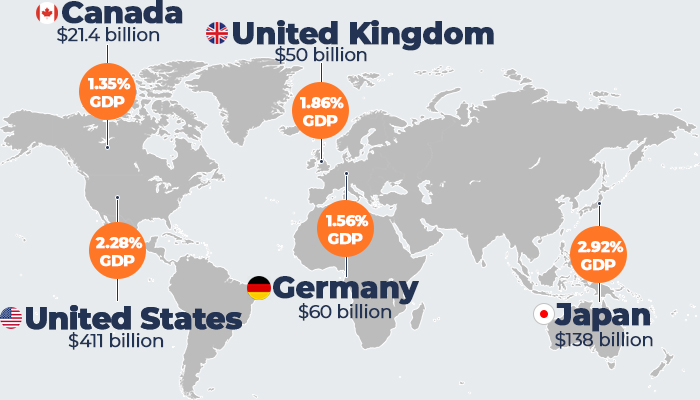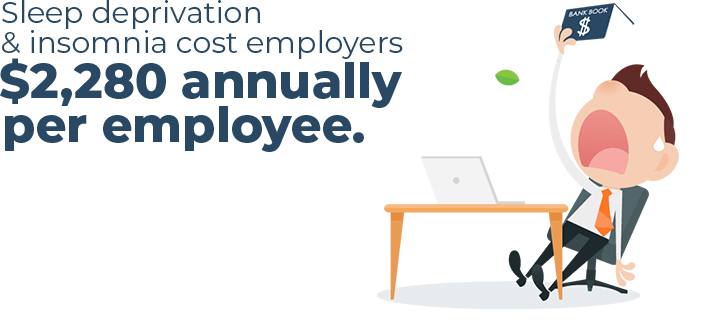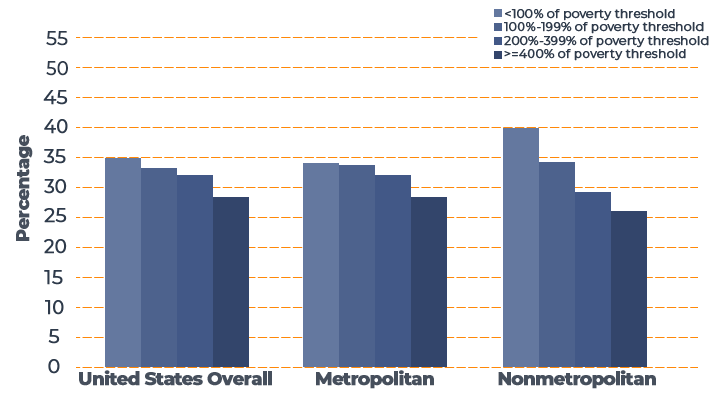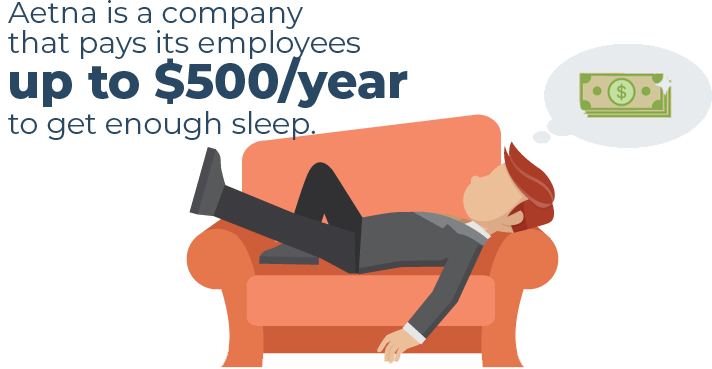The world seems to teach that the more you work, the more money you can make.
It makes sense, right? You work more, you earn more? So let’s all sleep less, work more, and retire early. Wrong.
When working under fatigue, statistics actually show that productivity plummets as costs go up.
Consider the story of Bob, a 9 to 5 junior accountant. At his firm, an opportunity has opened up for him to become a partner. To show his dedication, he begins working overtime, taking projects home, and cutting out two to three hours of sleep.
Bob’s alarm blares at 6:00 a.m. and he downs a cup of coffee and sluggishly trundles into work. Unfortunately, his head is pounding and he keeps dozing off. To make up for this he stays up that evening and works even more. Bob enters a vicious cycle of working late to make up for the less productive time during the day.
All the while Bob’s productivity is shifting, his health deteriorates, he misses work, and instead of getting the big promotion, Bob is fired.
The truth is that sleep deprivation costs both directly and indirectly, not to mention the loss in human life. Some say it costs us billions. So how does it all add up?
Global Numbers on Sleep Deprivation
Sleeping is an essential part of human nature and it is something that is being sacrificed for a cause that does not statistically add up. Around 3% of GDP is lost due to sleep deprivation, whereas a decrease in this statistic has the potential to add billions back into the economy. This map shows how much money is lost annually in the United States, Canada, the United Kingdom, Germany, and Japan.

Source: “Why Sleep Matters: Quantifying the Economic Costs of Insufficient Sleep”
– [1] Rand Corporation
The old saying, “time is money” is more relevant here than ever. Work time lost due to lack of sleep is literal money being wasted. The chart below demonstrates the correlation between lost time and lost money.
Total Working Time Lost Across Five OECD Countries
| US | UK | Germany | Japan | Canada | |
| # Full-time workers {in thousands} | 121,490 | 22,733 | 28,965 | 47,790 | 14,559 |
| # Part-time workers {in thousands} | 27,340 | 8,296 | 11,245 | 14,000 | 3,387 |
| Days lost {full-time}: < 6 hours | 528,377 | 87,372 | 60,545 | 185,289 | 22,089 |
| Days lost {full-time}: < 6 hours | 479,643 | 64,447 | 90,023 | 282,009 | 41,888 |
| Days lost {part-time}: 6 to 7 hours | 118,906 | 31,885 | 23,506 | 54,280 | 5,139 |
| Days lost {part-time}: 6 to 7 hours | 107,938 | 23,519 | 34,951 | 82,614 | 9,745 |
| Days lost: total | 1,234,864 | 207,224 | 209,024 | 604,191 | 78,861 |
| Hours lost: total | 9,878,910 | 1,657,792 | 1,672,192 | 4,833,532 | 630,886 |
Less Sleep Means Reduced Productivity
It’s been reported that 1 in 3 adults do not get enough sleep. In that statistic, some 35% of employed respondents reported they did not get enough sleep. — [2] American Academy of Sleep Medicine
What could be the cause of this and how does it affect the average worker and their employer?

Get More Info: How Much Sleep Do You Need?
“On an average day in 2017, 24 percent of full-time employed workers spent some time working while at home. The share of full-time employed workers performing work at home rose from 18 percent per day in 2003 to 24 percent in 2009, and remained relatively flat from 2009 to 2017.”
[3] Bureau of Labor and Statistics
A recent study published in the Journal of Occupational Health Psychology surveyed 699 USDA Forest Service Workers and found, “People who tend to linger on bad or stressful work experiences outside of working hours report more frequent insomnia than those who can successfully shut off these bothersome thoughts.”
“A study of 7,428 participants concluded that sleep deprivation and insomnia cost employers $2,280 annually per employee.”
[5] National Center for Biotechnology Information
Accidents and Work-Related Injuries
As people forgo sleep they experience a drop in cognitive abilities. This can affect mood, memory, attention, performance, and more. Throughout history, lack of sleep has helped lead to several serious workplace accidents. The following occurred due in part to human error and have been linked to possible sleep deprivation.

1979 Three Mile Island
“Although a mechanical problem precipitated the incident, it was chiefly this human error of omission and the subsequent flawed corrective action that caused the near meltdown of the reactor later that morning.”
![]()
1986, Chernobyl
[6] Dr. Merrill Mitler, Scripps Clinic Sleep
“Investigators have ruled that sleep deprivation was a significant factor in the 1979 nuclear accident at Three Mile Island, as well as the 1986 nuclear meltdown at Chernobyl.”
[7] Division of Sleep Medicine at Harvard Medical School
![]()
1986, The Challenger Explosion
“The recent report of the Presidential Commission on the Space Shuttle Challenger Accident did cite the contribution of human error and poor judgment related to sleep loss and shift work during the early morning hours.”
![]()
1989, Exxon Valdez Oil Spill
[6] Dr. Merrill Mitler, Scripps Clinic Sleep
“We’ve looked at some of the literature on the Exxon Valdez and of course the main point is that the timing of the accident was consistent with a sleep-related or fatigue-related error.”
[8] Dr. Merrill Mitler, Scripps Clinic Sleep Disorders Center
![]()
1999, American Airlines Flight 1420
“Contributing to the accident were the flight crew’s impaired performance resulting from fatigue and the situational stress associated with the intent to land under the circumstances…”
[9] U.S. Department of Transportation
Too big to depict on a timeline are the hundreds of lives lost every year due to smaller scale vehicular, medical, and factory related accidents caused by sleep deprivation.
“Dr. Charles Czeisler of the Division of Sleep Medicine at Harvard Medical School found that hospitals could reduce the number of medical errors by as much as 36 percent by limiting an individual doctor’s work shifts to 16 hours and reducing the total work schedule to no more than 80 hours per week.” — [10] Healthy Sleep
Health Risks
Most of the time sleep deprivation will not cost the lives of others. The greater risk could be at your own expense. Rand.org reports that sleep deprivation increases the risk of mortality by 13 percent. The following are only a few of the most serious conditions caused by sleep deprivation.
Heart Problems
“Even if you are a non-smoker who exercises and has no genetic predisposition to cardiovascular disease, skimping on sleep — or getting too much of it — can boost your risk of heart attack, according to a new University of Colorado Boulder study of nearly a half-million people.”
Diabetes
“The study demonstrated an association between habitual short nocturnal sleep with Type Two Diabetes Mellitus when compared to healthy controls.”
[12] Dr. Mohammed A. Al-Abr, Department of Clinical Physiology, Sultan Qaboos University Hospital
Obesity
“Laboratory studies and multiple epidemiological studies have linked short-sleep duration and poor-sleep quality to obesity risk.”
[13] Dr. Guglielmo Beccuti and Dr. Silvana Pannain
Stroke
“Sleep duration has a significant impact on stroke risk factors. While there appears to be an association between sleep duration and stroke risk factors such as hypertension, diabetes mellitus, obesity, dyslipidemia, and AF, the underlying pathophysiological mechanism remains unclear.”
[14] Dr. Chun Seng Phua, Department of Medicine, Melbourne Clinical School
Depression
“In conclusion, chronic sleep deprivation rather than acute sleep loss may lead to depression that is potentially attributable to the neurochemical changes that occur in the brain. On the other hand, depression may lead to disturbed sleep which could manifest as a symptom of a mood disorder.”
[15] Dr. Mohammed A. Al-Abr, Department of Clinical Physiology, Sultan Qaboos University Hospital
Direct and Indirect Costs for Employers
DIRECT
Less productive employees
“Less productive employees to say: A 2017 study published in the American Journal of Health Promotion discovered that employees who sleep less than or more than 8 hours per night had more daytime fatigue, less productivity, and more absenteeism from work.” — [16] American Journal of Health Promotion
Time
“Sleep deprivation… leads to the U.S. losing around 1.2 million working days a year.” — [17] Rand
INDIRECT
Coffee
“For 1 in 2 workers, a regular caffeine fix is essential to their work routine” — says Mary Lorenz from CareerBuilder. Many offices provide coffee for their employees. Therefore, if workers were to get better sleep the amount of coffee an employer provides would likely diminish.
Power and resources
“On average, a U.S. office building spends nearly 29 percent of its operating expenses on utilities, and the majority of this expenditure goes toward electricity
and natural gas.” — [18] Madison Gas and Electric
Many workers try to compensate for lost sleep by staying in the office late. This can require employers to leave amenities on past hours, costing companies hundreds to thousands of dollars.
Accidents
“These proportions are higher than for any other chronic condition, with annualized US population projections of 274,000 costly insomnia-related workplace accidents and errors having a combined value of US $31.1 billion.” — [19] National Center for Biotechnology Information
Direct and Indirect Costs for Employees
Workers end up shelling out a good deal of their own money to fight insomnia and other sleep-related disorders. Although not all of these statistics are directly related to lack of sleep, they are pretty telling as to how much sleep deprivation can cost individuals and families.
DIRECT
Stimulants
“As a point of reference, the average American spends about $1,100 a year on coffee.” — [18] Madison Gas and Electric
Time
“The global market for sleep aids and technologies is expected to reach $84.9 billion by 2021 from $66.3 billion in 2016, rising at a compound annual growth rate (CAGR) of 5.1% from 2016 through 2021.” — [20] Natana Raj, BCC Medical Analyst
INDIRECT
Heart Disease
“By 2030, annual direct medical costs associated with cardiovascular diseases are projected to rise to more than $818 billion” — [21] Centers for Disease Control and Prevention Foundation
Obesity
“Annual health care costs of obesity for all adults in the United States were estimated to be as high as $147 billion dollars for 2008.” — [22] Centers for Disease Control and Prevention
Diabetes
“According to the American Diabetes Association’s Economic Costs of Diabetes in the U.S. in 2017, the average medical expenditure for people with diagnosed diabetes is about $16,750 per year, of which about $9,600 is due to diabetes.” — [23] Centers for Disease Control and Prevention
Socio-economic Impact
Economic status has been known to affect how much sleep people get. Workers in lower-income families tend to sleep less than middle and upper class. Work conditions like low wages and graveyard shifts, among other factors, likely produce this statistic.
A study done by the 2013 National Health Interview Survey, displays the percentage of low-income families who get fewer than 6 hours of sleep each night.
% of Adults Who Get ≤6 Hours of Sleep
Source: “National Health Interview Survey, United States, 2013”
– [24] Centers for Disease Control and Prevention
What Can We Do?
One Japanese company, Crazy INC, is fighting the problem by paying their employees with cafeteria points to get at least 6 hours of sleep each night, five days a week. This is worth $540 a year. — [25] PayScale
Aetna is another company that is paying its employees to get sufficient rest. The brand’s CEO and chairman, Mark Bertolini, said they are willing to pay their workers up to 500 dollars a year to get enough sleep. — [26] CNBC

Not all companies need to pay their employees to get rest. The Centers for Disease Control and Prevention recommends the following.
Employers can consider adjusting work schedules to allow their workers time to get enough sleep.
Employers can also educate their shift workers about how to improve their sleep.
Encouraging employees to get healthy sleep could pay off in the long run. As they get more sleep, they are more likely to come to work and crush it.
Conclusion – More Sleep Means Increased Productivity
Here’s the bottom line: Better Sleep = More Money
If corporations want to make more money, they could begin by encouraging good sleep practices around the workplace. RAND pointed out that if workers could increase their sleep by just an hour, moving from 6 to 7 hours of rest, this could improve the U.S economy by 224.6 billion dollars.
And it is not only the corporations who benefit. Economists Matthew Gibson and Jeffrey Shrader found that folks who get enough sleep could increase their earning potential by up to 4.5%. — [27] Jeffrey Shrader
So, here is our challenge to you. If you are in charge of a group of workers, share this info and teach good sleep practices. Then go and practice what you preach.
If you are an employee or work for yourself, go to bed tonight and do what you can do get between 7 and 8 hours of sleep. As we’ve learned, sleep can equal significant savings and earnings.
Work smarter, not harder by getting off on the right foot – a good night’s rest!
We’ll end with a quote from Dr. Alex Dimitriu, a Stanford-trained sleep specialist and Psychiatrist.
“Sleep, it turns out, might be one of the most important activities of the brain – necessary to consolidate memories, rehearse emotions, form connections for creativity and ingenuity, and also fine-tune our metabolism. Fine-tuning both sleep and wake states has led to some truly amazing breakthroughs for my clients.”

Mark Mattei
Content Writer
About Author
Mark likes to study sleep health, write content, and produce videos on his findings. When he’s not, he’s likely writing the great American screenplay, growing out his beard, or spending time with his family.
Mark is an exclusive side sleeper with broad shoulders who looks for good pressure relief for his hips and shoulders.
Side Sleeper
References:
[1] Why Sleep Matters: Quantifying the Economic Costs of Insufficient Sleep, Rand Corporation
[2] CDC: More than 1 in 3 Americans are sleep-deprived, American Academy of Sleep Medicine
[3] American Time Use Survey Summary, Bureau of Labor Statistics
[4] Want Better Dleep? Leave Your Work at the Office, Medical News Today
[5] Insomnia and the performance of US workers: results from the America insomnia survey, National Center for Biotechnology Information
[6] Catastrophes, Sleep, and Public Policy: Consensus Report, National Center for Biotechnology Information
[7] Sleep, Performance, and Public Safety, Division of Sleep Medicine at Harvard Medical School
[8] Records detail long hours worked by crew of Exxon Valdez, Anchorage Daily News
[9] American Airlines Flight 1420, MD-82, N215AA, Lessons Learned
[10] Sleep, Performance, and Public Safety, Healthy Sleep
[11] Sleeping Too Much — or Too Little — Boosts Heart Attack Risk, Science Daily
[12] Habitual Sleep Deprivation is Associated with
Type 2 Diabetes: A Case-Control Study, National Center for Biotechnology Information
[13] Relationship between Sleep Duration and Risk Factors for Stroke, National Center for Biotechnology Information
[14] Sleep and obesity, National Center for Biotechnology Information
[15] Sleep Deprivation and Depression, A bi-directional association, National Center for Biotechnology Information
[16] Association Between Sleep and Productivity Loss Among 598 676 Employees From Multiple Industries, American Journal of Health Promotion
[17] Lack of Sleep Costing U.S. Economy Up to $411 Billion a Year, Rand Corporation
[18] Managing energy costs in office buildings, Madison Gas and Electric
[19] The associations of insomnia with costly workplace accidents and errors: results from the America Insomnia Survey, National Center for Biotechnology Information
[20] Sleep Aids: Technologies and Global Markets, BBC
Research
[21] Heart Disease and Stroke Cost America Nearly $1 Billion a Day in Medical Costs, Lost Productivity, Centers for Disease Control and Prevention Foundation
[22] Disability and Obesity, Centers for Disease Control and Prevention
[23] Lifestyle Change Program Resources for Employers, Centers for Disease Control and Prevention
[24] QuickStats: Percentage of Adults Who Average ≤6 Hours of Sleep,* by Family Income Group† and Metropolitan Status of Residence§ — National Health Interview Survey, United States, 2013, Centers for Disease Control and Prevention
[25] This Japanese Company Pays Employees to Sleep, PayScale
[26] Why Aetna’s CEO pays workers up to $500 to sleep, CNBC
[27] Time Use and Labor Productivity: The Returns to Sleep, Jeffrey Shrader
